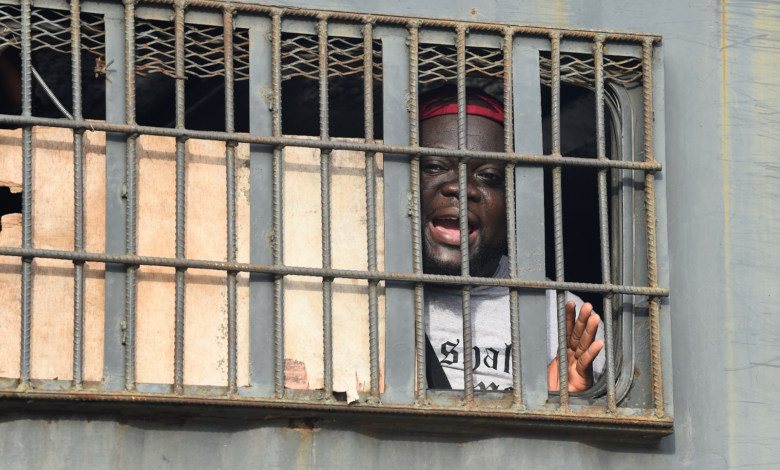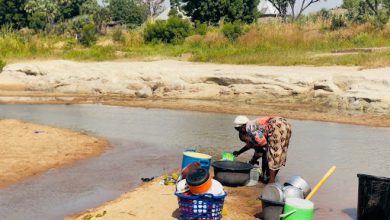Nigerian Journalists Dodged Attacks, Mourned Lost Colleagues As They Chased Stories In 2023
According to the press attack tracker updated by the Centre for Journalism Innovation and Development (CJID), attacks against journalists and media workers escalated to an unprecedented level, as 74 press attacks were recorded this year.

Three days after he was declared missing by his family, the corpse of Hamisu Danjibga, a long-serving broadcast journalist at the Voice of Nigeria (VON), was found in a soakaway pit a few metres from his residence at the Samaru Quarters in Zamfara, North West Nigeria.
Danjibga, who reported extensively on the widespread insecurity in his state, was kidnapped on Sept. 18, but his abductors, according to the police, stabbed him to death when he tried to overpower them.
“I felt terribly sad when my father was found dead. But whenever I remember that he died as a martyr, I feel a sense of relief,” said Surajo Danjibga, son of the deceased, who spoke to Daily Trust newspaper.
Twenty-twenty-three was a tough year for Nigerian journalists. There were many instances of journalists getting harassed, threatened, or even paying the supreme price in the course of their work.
Around the same period as Danjibga’s death, the lifeless body of Yusuf Mubaarak, a 27-year-old journalist, was found in the Unity Road area of Kwara State. Though media coalitions have demanded an investigation into the circumstances surrounding his death, the police have yet to make any arrests.
There were many other instances of harassment. WikkiTimes Publisher Haruna Mohammed was detained for five days in February after covering a protest by voters in Bauchi, allegedly on the orders of the governor. Premium Times journalist Saviour Imukudo was threatened for exposing a poorly executed federal project in Akwa Ibom State in January.
According to the press attack tracker updated by the Centre for Journalism Innovation and Development (CJID), a media and development African think-tank, attacks against journalists and media workers in Nigeria escalated to an unprecedented level in 2023, as 74 press attacks were recorded. The tracker shows that physical attacks account for 47 per cent of the incidents, denials account for 13 per cent, and equipment damage/seizure account for seven per cent.
The last general elections were marred with various attacks on journalists. Fourteen journalists and media workers were detained, harassed, or attacked while covering the federal elections on Feb. 28.
Also, there were at least 19 attacks in nine states against journalists and media workers during the March 18 gubernatorial elections from Ogun to Osun, Sokoto, Lagos, Akwa-Ibom, Benue, Edo, Kano, and Nasarawa. Most of the perpetrators were political thugs and security personnel.
Narrating his bitter experience in Abuja, Dayo Aiyetan, Founding Executive Director of the International Centre for Investigative Reporting (ICIR), said his clothes were torn, and his phone, car key, purse, and a pouch containing his debit cards were taken away by thugs for recording a disturbance during the elections.
Another reporter with the newspaper, Sinafi Omanga, was attacked by soldiers, causing him bodily harm and broken spectacles on March 30.
“Nigerian authorities should swiftly identify and hold accountable those responsible for the recent attacks, harassment, and intimidation of journalists covering state elections and ensure that members of the press feel safe to report on political issues,” said Angela Quintal, Africa programme coordinator of the Committee to Protect Journalists (CPJ), an independent non-governmental organisation.
“Freedom of the press during elections, which, of course, includes journalists’ safety to do their work, is fundamental to the democratic process,” he added.
Concerned about the wave of attacks in Nigeria, CPJ wrote an open letter to President Bola Tinubu to ensure freedom of the press and reform regulations aiding the surveillance of journalists in August.
Despite the letter and many other agitations by civil society organisations, Nigeria’s political class continue to undermine the country’s democracy with their impunity and win-at-all-costs attitude. For instance, a group of armed men attacked six journalists working with The Sun, Television Continental (TVC), Africa Independent Television (AIT) and Nigerian Television Authority (NTA) in Bayelsa.
They were attacked while reporting the aftermath of clashes between younger members of the Opu Nembe community and their leaders. Aside from being robbed, the journalists were injured while fleeing the scene.
Speaking on their experience during the attack, Joseph Kunde of TVC said, “It took the grace of God to survive. In fact, a colleague from AIT had to pretend to be dead after she was hit so badly. He would have been killed if he did not pretend. I was also hidden in a house by a woman and her children for nearly an hour. They later showed me an escape route, [which I followed] until I found a police checkpoint.
“Unfortunately, my cameraman was not as lucky as I was. He ran into the hoodlums who snatched his camera, microphone and every other personal item he had on him. He was beaten to a stupor and lost two of his teeth in the process.”
In reaction to this, Ayo Ademiluyi, a lawyer and human rights activist, urged the government to create an enabling environment for a free and independent press. “The press has the social responsibility to hold power to account, and that should not be threatened.”
Evelyn Okakwu, a Nigerian Journalist with considerable knowledge of the media and press freedom, also told HumAngle that the laws that criminalise the press in Nigeria must be reformed, and publishers should take it upon themselves to get lawyers to defend their journalists when they face legal challenges.
Support Our Journalism
There are millions of ordinary people affected by conflict in Africa whose stories are missing in the mainstream media. HumAngle is determined to tell those challenging and under-reported stories, hoping that the people impacted by these conflicts will find the safety and security they deserve.
To ensure that we continue to provide public service coverage, we have a small favour to ask you. We want you to be part of our journalistic endeavour by contributing a token to us.
Your donation will further promote a robust, free, and independent media.
Donate HereStay Closer To The Stories That Matter




